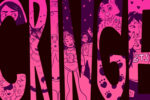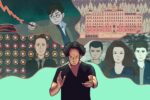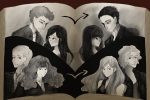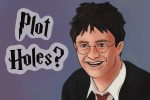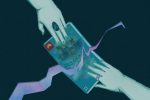Recently, J. K. Rowling has been getting a lot of hate for her transphobic remarks on Twitter. The controversy was initially sparked in June when she tweeted the following in response to an article about menstruation: “‘People who menstruate.’ I’m sure there used to be a word for those people. Someone help me out. Wumben? Wimpund? Woomud?”
Members of the LGBTQ community were outraged at the implication that cisgender women were the only people who menstruate, and Rowling’s follow-up remarks did not help her case. The controversy continued when Rowling published a new book, “Troubled Blood,” that features a cross-dressing serial killer.
The news surrounding Rowling recently has been all but positive, but we can’t forget the joy that she’s brought to countless people in the past, specifically through the beloved “Harry Potter” series. “Harry Potter” was an absolute essential part of so many peoples’ childhoods, mine included.
However, not all “Harry Potter” media is created equal. The book series and movies give very different experiences. The books are the original source of the “Harry Potter” world, and Rowling’s descriptive imagery and character development brought the magical fantasy land of witches and wizards to life. The movies have some upsides, like special effects and iconic acting, but overall, they simply cannot compare to Rowling’s original written masterpiece.
Of course, the superiority of books is not “Harry Potter” specific; reading in general provides numerous health benefits. From a neurobiological standpoint, reading activates and strengthens your brain’s neural pathways, which keeps your mind functioning at its best. Having to keep track of complex plots and characters improves your memory, and getting into the characters’ heads increases empathy. Studies have shown that books can reduce stress by as much as 68%, as well as decrease depression. Additionally, reading decreases mental decline in the elderly by 32%, and can make you 2.5 times less likely to develop Alzheimer’s disease later in life.
Reading books is especially important for children. Kids who read often are better able to “grasp abstract concepts, apply logic in various scenarios, recognize cause and effect, and utilize good judgement.” Reading before preschool is linked to an increased likelihood of academic success. Also, books are great for developing vocabulary, exposing children to 50% more words than TV shows and movies.
Screen media, on the other hand, is not quite so healthy. The blue light from screens decreases the production of melatonin — a hormone that induces sleep — which can lead to insomnia. Additionally, screen time has been linked to a decrease in gray matter in the brain and an increase in anxiety and depression in young people.
Now that we’ve established the superiority of books in general, it’s time to delve into why the “Harry Potter” series specifically is better in book form. First of all, the movies are seriously lacking in character development because of the decreased dialogue and absence of descriptive paragraphs. The books are narrated from a third-person limited point of view, giving the reader access to Harry’s thoughts. Although Daniel Radcliffe, Rupert Grint, Emma Watson and all of the other actors do a high-quality job portraying their characters, it’s simply a different experience when you don’t get to read Rowling’s enlightening descriptions. Some vital characters are even cut out of the movies completely, including Peeves, Winky, Ludo Bagman, Professor Binns (and several other ghosts), Frank and Alice Longbottom, Andromeda and Ted Tonks, Marietta Edgecombe and Charlie Weasley.
Characters aren’t the only things missing from the movies because of the limited timeframe; many story elements were cut as well. We don’t get to enjoy various subplots, like Hermione’s adventures with S.P.E.W, Rita Skeeter turning out to be an animagus, Tonks and Lupin’s relationship and the ever-so-catchy “Weasley Is Our King” anthem.
The movies also lose the sense of whimsy and hilarity that was present in the books. The movies have a much more somber feel to them, using mysterious music, lower lighting and sparser dialogue. One big example of missing whimsy is in the portrayal of Albus Dumbledore. In the books, Dumbledore bursts with eccentricities that make you fall in love with the character. However, Richard Harris and Michael Gambon (who played Dumbledore in the movies) had a much more straight, solemn interpretation. In a story with names like “Hogwarts” and “Hufflepuff,” it’s essential to maintain a sense of playfulness in order to make the world cohesive.
Another important distinction between the books and the movies is the time it takes to read and watch them. As any “Harry Potter” fan will tell you, the more time spent in the “Harry Potter” world the better, and the books give you a significantly longer experience. If we assume that the average person’s reading speed is 300 words per minute, we can estimate that it would take approximately 60.23 hours to read the entire 4,224-page series. The movies, on the other hand, clock in at only 19.67 hours — less than one-third of the length of the books.
If you want real, quantitative proof that the books are superior, all you need to do is follow the money. As of 2017, the box office sales of all Harry Potter movies combined totaled to $7.2 billion, whereas the total gross book sales reached $7.7 billion, which is 6.5% higher. People would rather spend their money to curl up in bed with a paperback than go out to the theaters.
Especially during the pandemic, with our entire lives revolving around our screens, it’s important to take some time with good old paper and ink. But, when all is said and done, both the “Harry Potter” books and “Harry Potter” movies are true masterpieces. If you have 79.9 hours to spare (or even if you don’t — the other things on your to-do list can wait) and you haven’t yet experienced the joy of this wonderful series, please take the time to immerse yourself in J.K. Rowling’s magical world.






